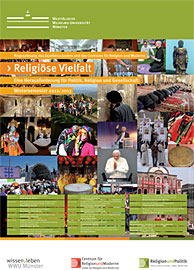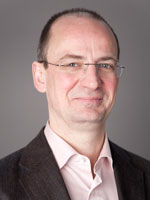“Religious policy favours churches over Islam”
Problems of religious plurality explored by the Cluster of Excellence during the winter term – researcher proposes committee of enquiry on the plurality of religions

Tuesdays, from 6.15 to 7.45 p.m., Lecture hall F2 at the Fürstenberghaus, Domplatz 20-22
According to expert opinion, German religious policy still favours the large Christian churches over other religious communities such as Islam. “Since the 1990s, Muslims have been fighting for a religious liberty which treats everybody equally. This is taking far too long”, said political scientist Prof. Dr. Ulrich Willems from the Cluster of Excellence “Religion of Politics” of the University of Münster. Success has been a gradual process, with developments such as Germany’s first regular Islam classes in North-Rhine Westphalia, the first draft of a state agreement with Muslims in Hamburg, and the three centres of Islamic Theology nationwide in Germany. The scientist has announced a public lecture series on “Religious Plurality. A challenge for politics, religion and society”. The series organised by the Cluster of Excellence and the new “Centre for Religion and the Modern Age” (CRM) will start on 9 October.

Prof. Dr. Ulrich Willems
“Religious plurality remains to be a challenge in Europe”, emphasised the speaker of the CRM. It has increased due to the immigration of non-Christian people and a growing number of people unaffiliated with any religion. The scientist advocated a committee of enquiry at federal or federal state level, dealing with urgent issues of religious plurality in Germany and said that the public was unprepared for the problem. “There has never been a discussion about religious policy. It has remained the domain of the courts and of political elites. There is a lot of catching-up to do.” If today legal exceptions were made for religious minorities – as regards, for example, kosher or halal slaughter, the circumcision of boys, or the muezzin’s call to prayer – people would wrongly perceive this as if they had to adapt to new arrivals. “What is missing here is education.”
Religious plurality from antiquity until today
Many religious political conflicts are based on the Christian churches being favoured, according to the expert: religious policy is heavily tailored to them by means of constitutional provisions and agreements with established churches. Jehovah’s Witnesses, for example, had to take long running legal action in order to gain the same corporate body state. Other religious communities such as Islam are lacking the prerequisites for this as regards, for example, member structure or an institutional contact person for the state. “They cannot profit from many of the benefits. This causes an asymmetry.”
The Cluster of Excellence’s lecture series will analyse numerous examples of religious plurality, from antiquity and the Middle Ages to the early modern age and present-day Germany, England, China and the U.S.A. According to Prof. Willems, “the models and practices of other ages and cultures may not serve as blueprints, but they may inspire solutions to contemporary problems”. Religious Studies, Historical Science, Islamic Studies and Law as well as Theology, Sinology, Sociology and Political Science will be heard.
The lecture series provides a comparison between different religions such as Christianity, Islam, Buddhism and Hinduism. Several lectures will deal with the reaction of the Christian denominations to religious plurality. “The large churches have lost their monopoly position in politics and society. They need to find new ways to communicate and assert their interests”, according to Prof. Willems. Another section of the series’ programme addresses how plurality is dealt with in legal, sociopolitical and economic-political terms. One look at the history of religion will concentrate on esotericism and astrology. The scientist remarked that the wisdom teachings and occult sciences that emphasise the spiritual development of the individual have been in existence since antiquity. They have nothing to do with “scientifically dubious books and TV shows” of today. The lecture series follows up on the Cluster’s 2010 series “Integration of Religious Plurality”.
“Science cannot provide recipes for a daily political routine. However, it may help to break down consolidated patterns of perception”, continued political scientist Willems. For example, “the” Islam, both historical and contemporary and just as Christianity, was much more complex than many would think. There were also inappropriate conceptions regarding an alleged religious unity in European history. “The Middle Ages, for example, were never as uniform as the term ‘Christian West’, which is used frequently at the moment, suggests. Even back then, Christianity was heterogeneous and defined itself as opposed to Islam.” (vvm)
Programme
| 09.10.2012 | Fabian Wittreck, Münster | Religiöse Paralleljustiz im Rechtsstaat? |
| 16.10.2012 | Rainer Albertz, Münster | Wie viel Pluralismus kann sich eine Religion leisten? Zum Umgang mit religiöser Vielfalt im Alten Israel |
| 23.10.2012 | Perry Schmidt-Leukel, Münster | Hinduismus – eine pluralistische Religion? |
| 30.10.2012 | Joachim Gentz, Edinburgh | Das Harmoniemodell religiöser Pluralität in China |
| 06.11.2012 | Judith Könemann, Münster | Religiöse Akteure in der Öffentlichkeit. Kirchliche Positionierungen und Interessensvertretung in der (Zivil-) Gesellschaft |
| 13.11.2012 | Kocku von Stuckrad, Groningen | Plurale Wissensansprüche in der europäischen Religionsgeschichte: Astrologie, Esoterik, Wissenschaft |
| 20.11.2012 | Hugh McLeod, Birmingham | The Pluralism of everyday life: England since 1870 |
| 27.11.2012 | Benjamin Scheller, Duisburg/Essen | Religiöse Pluralität und religiöse Ambiguität im Mittelalter. Das Königreich Sizilien im 12. Jahrhundert |
| 04.12.2012 | Sigrid Roßteutscher, Frankfurt a. M. | Das Sozialkapital der Religionen |
| 11.12.2012 | Gudrun Krämer, Berlin | Einheit, Vielfalt, Differenz: Pluralität im zeitgenössischen islamischen Kontext |
| 18.12.2012 | Christel Gärtner, Münster | Die Pluralisierung religiöser Identität |
| 08.01.2013 | Karl Gabriel, Münster | Moderner Katholizismus und religiöser Pluralismus: Von der Abwehr zur Versöhnung - und wieder zurück? |
| 15.01.2013 | Michael Hochgeschwender, München | Amerikanische Evangelikale, Katholiken und der Pluralismus in Politik und Ökonomie in den USA |
| 22.01.2013 | Tom Banchoff, Washington | American Civil Religion in a Multipolar World |
| 29.01.2013 | Thomas Großbölting, Münster | Warum sich die deutsche Gesellschaft mit religiöser Vielfalt so schwer tut – eine (zeit)historische Erkundung |
Winter Semester 2012/2013
Tuesdays,18.15 bis 19.45 Uhr
Lecture hall F2 at the Fürstenberghaus
Domplatz 20-22
48143 Münster

